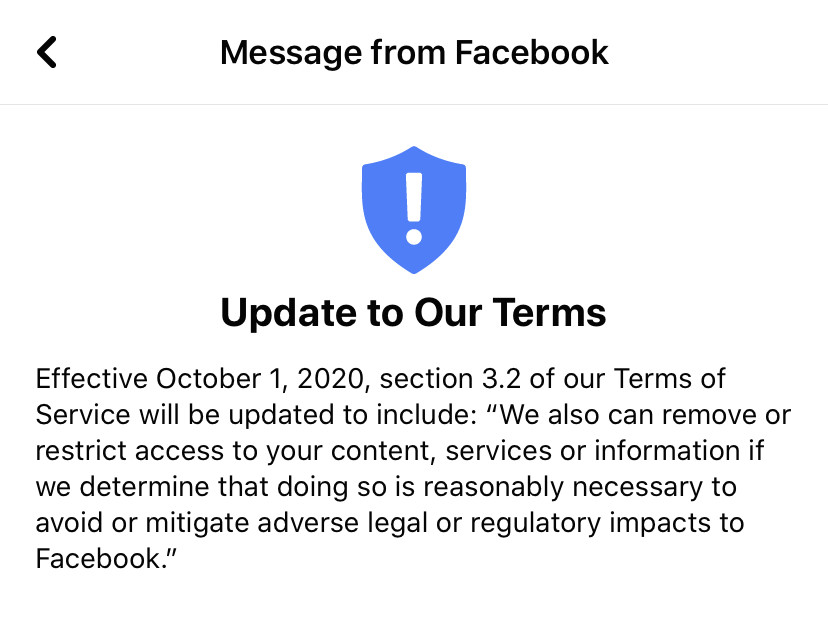
Facebook Threatens to Block News in Australia if World-First Laws Get Passed
September 1, 2020Facebook is threatening to block Australians from sharing news content on their social media channels, including Instagram, in response to a world-first attempt by the country’s government to crack down on how big tech companies profit from local media.
The Australian Competition and Consumer Commission’s (ACCC) News Media Bargaining Code, announced in detail at the end of July, would essentially compel companies like Google and Facebook to pay Australian media organisations for hosting their content, in order to “support a sustainable Australian media landscape in the digital age”.
Google kicked back against the proposal shortly after its announcement, issuing what some described as a scare campaign in the form of an “open letter to Australians” that warned the code would force the tech giant “to provide you with a dramatically worse Google Search and YouTube.”
Now Facebook appears to have taken a similar tack.
"Assuming this draft code becomes law, we will reluctantly stop allowing publishers and people in Australia from sharing local and international news on Facebook and Instagram," Facebook's Australia and New Zealand managing director Will Easton said in a statement on Monday. "This is not our first choice—it is our last. But it is the only way to protect against an outcome that defies logic and will hurt, not help, the long-term vibrancy of Australia's news and media sector."
Easton accused the proposed legislation of “[misunderstanding] the dynamics of the Internet”, and insisted that news media benefits more from social media than vice versa.
“News represents a fraction of what people see in their News Feed and is not a significant source of revenue for us,” he wrote. “Still, we recognize that news provides a vitally important role in society and democracy, which is why we offer free tools and training to help media companies reach an audience many times larger than they have previously. News organisations in Australia and elsewhere choose to post news on Facebook for this precise reason, and they encourage readers to share news across social platforms to increase readership of their stories.”
Easton further claimed that in the first five months of 2020, users had clicked on Australian news items shared on Facebook 2.3 billion times, which allegedly generated $200 million in revenue for Australian media organisations. He also said the company had proposed bringing Facebook News to Australia—“a feature on our platform exclusively for news, where we pay publishers for their content”—following its 2019 launch in the United States. Easton claimed US publishers who partnered with Facebook News “have seen the benefit of additional traffic and new audiences.”
“But these proposals were overlooked,” he said. “Instead, we are left with a choice of either removing news entirely or accepting a system that lets publishers charge us for as much content as they want at a price with no clear limits. Unfortunately, no business can operate that way.”
It is unclear how this news ban would be implemented, and it’s understood Facebook is still working through the details, but a notification its mobile app announces that the company has already updated its terms of service.

Those changes, which come into effect next month, give Facebook the right to block information that could lead to "regulatory impacts" on the company—such as those outlined in the News Media Bargaining Code.
Google’s hostile response to the ACCC’s proposed laws was criticised by a number of experts and media figureheads, who accused the tech giant of stoking unwarranted fear among Australians. Barnet cast serious doubts over the legitimacy of Google’s arguments, Belinda Barnet, senior lecturer in Media and Communications at Melbourne’s Swinburne University of Technology, suggested that Google was making a mountain out of a molehill in order to avoid sharing a portion of its multi-million dollar ad revenue with the country’s media organisations.
“It’s tempting to conclude that Google is simply trying to gaslight its users by sowing doubt about the wisdom of the new regulations—because it doesn’t want to pay,” she wrote in a piece for The Conversation.
The ACCC also hit back at Google, debunking claims that the tech giant would havre to start charging users for its services and denouncing several of the letter’s statements as “misinformation”.
Public consultation for the News Media Bargaining Code closed on Friday, and the Government is now considering the feedback.
Follow Gavin on Twitter

